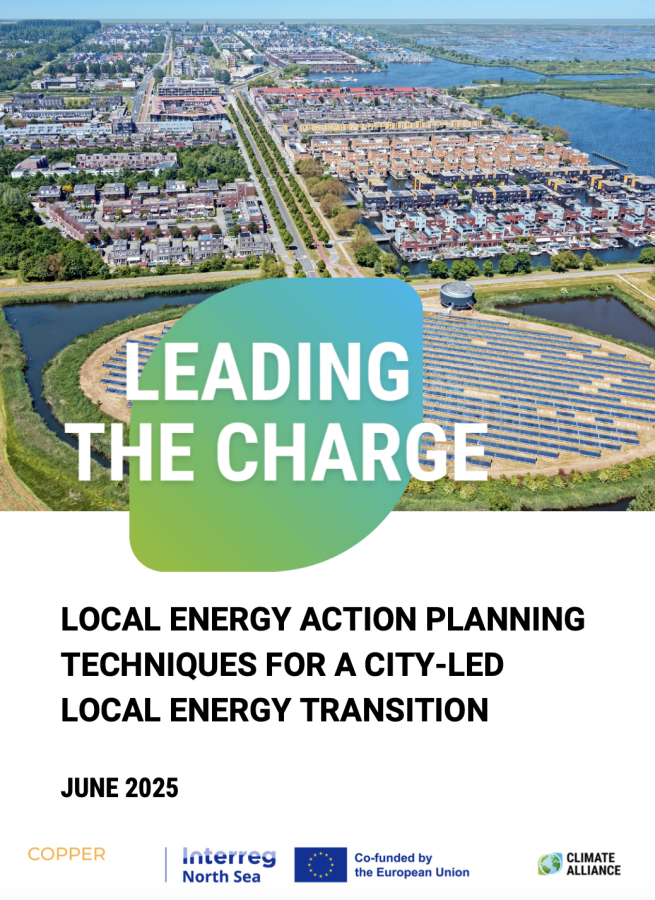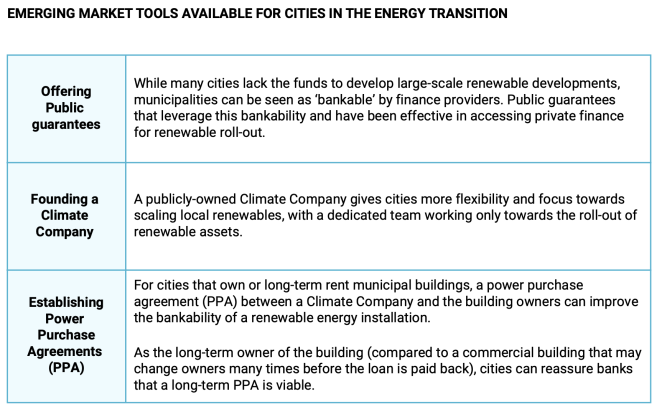In June 2025, the Climate Alliance, an international organisation working to combat climate change with over 2,000 members, released a report: “Leading the Charge - local energy action planning techniques for a city-led local energy transition”. The report discusses the increasing role of cities within the energy transition and how they can become local leaders.
The BRAVE project, with its focus on scaling up clean energy solutions through public sector-driven financial and partnership solutions, reviews the report for important insights.

The roles of cities in the energy transition is changing and increasing
While the management of the energy system traditionally lay in the hands of centralised energy production and distribution companies (e.g. TSOs and DSOs), the growing decentralisation of smaller scale energy production in recent decades now places more responsibility on cities to plan and manage the energy sector. As cities become denser, more populated, and more complex, city-led energy planning is no longer a choice, but an urgent and growing responsibility to ensure a reliable, affordable, and clean supply of energy to urban dwellers.
On top of this, the transition to a cleaner energy supply used to be considered a niche topic within the domain of public administration Environmental Departments. However, with an increasing recognition of the impact of energy prices on local business - and broader European - competitiveness, the priority for generating clean, affordable, and local energy now moves beyond Environmental Departments alone. Instead, energy is now a crucial strategic and economic pillar across many other city departments including urban planning, mobility, or finance. The growing overlap between departments that is created through their interest in energy must be addressed by breaking out of typical silo thinking and finding ways to foster more collaboration, capacity building and energy knowledge creation.
An inspiring example comes from the city of Arnhem (NL). Arnhem has created the “Accelerating the Energy Transition” programme, bringing together 25 civil servants from different departments and working independently on energy topics, while directly communicating to the Secretary General of the municipality. Arnhem has recognized that the energy transition demands new, agile and flexible ways of working.
As a means for cities to take a more proactive role in energy system planning, this Climate Alliance report introduces the concept of local energy action planning (LEAPs). LEAPs are long-term plans to ensure that the local transition supports wider regional economic and societal missions, through closer collaborations with relevant stakeholders like DSOs, local businesses, and large scale housing developers. This shows how cities are growing into their new role as strategic energy system coordinators, not just neutral market facilitators.
How does this connect to the BRAVE project?
- Responsibilities: Decentralised energy systems bring new stakeholders to the energy market, adding complexity and a growing need for new strategies for stakeholder planning and management.
- Long-term planning: While cities are increasingly creating long-term energy strategies, they don't always automatically and explicitly integrate the crucial steps of financing, scaling, and replicating clean energy solutions. The BRAVE pilots can advocate for the inclusion of these elements to ensure that clean energy projects are prioritized and successful.

Cities and private-public partnerships - the new financing catalyst
Cities are increasingly leveraging public sector tools, like municipal climate companies and public guarantees, to attract new sources of private finance for renewable energy projects that would otherwise be unattractive investments. In doing so, cities increasingly adopt their new role as “market-makers”, actively creating new market opportunities, collaboration ecosystems, and mutually beneficial partnerships for clean energy solutions to be developed with local private businesses and investors.
Inspired by Aarhus (a BRAVE consortium member), the municipality of Albertslund in Denmark has created its own Climate Company and offers an 80% public guarantee to a private bank loan, with which the town installed rooftop solar panels. An additional example of cities creating space for new market actors is the town of Zoersel in Belgium which is promoting the local energy cooperative “Campina Energie” to citizens, supporting their commitment to expanding the use of solar energy.
The Climate Alliance report describes a few of the public-private partnership tools that cities are using to advance the energy transition.
How does this connect to the BRAVE project?
- Tools: Beyond just providing supply-side subsidies, cities are increasingly offering more dynamic and innovative financing strategies and tools to leverage new private investment into the energy transition.
- The BRAVE pilot regions (Aarhus, Amiens, Antwerp, Brabant, Hannover, Malmö, and Rotterdam) are testing innovative financing models and analysing them for replicability. Climate Alliance’s report gives BRAVE additional insights into how other European cities are approaching this challenge. This is a great opportunity for further collaboration and cross-city learnings.
Cities as policy influencers
Cities are uniquely positioned between national and European regulations - while understanding their specific local needs and context, cities also have a unique opportunity and ability to lobby policymakers for the new regulations required to advance the local energy transition. An example cited in Climate Alliance’s report is the city of Ghent advocating for a tax shift in Belgium to make electricity more affordable than gas for heating - electricity is currently over 4x more expensive than gas in Belgium, creating a huge disincentive for homes and businesses to switch from fossil gas to clean electric heating.
Furthermore, cities have the opportunity to “support on-the-ground actions, with coordination, facilitation, funding, contracting, and planning initiatives that organise and empower actors to deliver energy transitions on the ground” (p.11). The report elaborates that cities can positively influence local policy, economic, and societal conditions for the energy transition, e.g. by supporting and participating in new business models that make clean energy more affordable.
How does this connect to the BRAVE project?
- The BRAVE pilot regions are committed to identifying barriers in policy and regulations that may hinder their financial models. This is exemplified by the low gas prices in Belgium (location of one of the BRAVE pilots) which hinder the broader uptake of greener electric heating options. The pilots are exploring how they can leverage their unique role as policy influencers and local energy system advocates to reduce these hurdles, and make clean energy solutions more accessible for households, local businesses, and investors.
Ultimately, Climate Alliance’s "Leading the Charge" demonstrates that a collaborative, city-led approach to energy transition is not only possible but also essential for a competitive, sustainable, and locally-driven future. This aligns with BRAVE’s goal of developing regional public-private investment ecosystems across Northern Europe to help clean energy solutions break out of the pilot trap.
